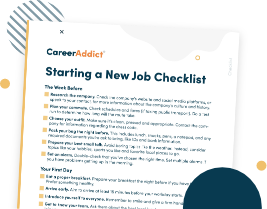
Applying for the position that matches your experience is imperative to a successful job search.

You won’t hold only one position for the entirety of your career. If you want to advance professionally, you will inevitably have to change positions multiple times. However, while changing positions is common, it can also be challenging to know which position level to apply for.
Determining which position level to apply for is an important decision in your career. If you take a level too low, you may not be challenged enough, and your career development could stifle. However, if you take a position too high, you may not have enough knowledge and skills to be successful — which could also hurt your career.
This is why it’s important to ensure that you’re applying for roles that are at your level so that you can give yourself the best chance of success in your next career move.
Although job levels and career trajectories vary depending on industry, field and company, there are some general guidelines that can you help you determine the position level to apply for. Below is a breakdown of the five most common job levels:
As the name suggests, entry-level positions are entry points to a particular field or industry. Recent graduates, who are just joining the workforce will typically start their careers with an entry-level position. However, career changers who lack experience in a particular field or industry may also be suitable for an entry-level role.
These roles will typically require up to 2 years’ experience and possibly a university degree. Completing an internship prior to applying for an entry-level role will improve your application, as it shows that you have already gained some experience in the industry or field.
Other than the years of experienced required, another indicator as to whether a role is entry level will be the job title. Titles that include terms such as assistant, analyst, coordinator or associate will in many cases be entry level.
Grab a FREE new job checklist Instant Download Fillable PDF Made by Pros
In intermediate roles, you will still be an individual contributor and won’t be responsible for people management. However, you will be required to have more experience than you would for an entry-level role, and take on more responsibilities. Although there are variances between industries and fields, you may be responsible for managing larger projects or important clients, for example, in an intermediate role.
At this stage, you’ll be required to have around 2–5 years of experience and to have shown that you are well-versed in the type of work you are pursuing. Some examples of intermediate-level job titles are specialist, senior analyst or senior associate.
After you’ve been in a field or industry for some time, you may decide you want to move into a people management role. A first-level management role will be the entry point to start managing subordinates. In terms of responsibilities, a first-level management role will typically vary from entry-level or intermediate individual contributor roles because you’re now responsible for the performance of not only yourself but also your subordinates.
While organizations differ, first-level managers usually don’t have a whole department under them, but rather a smaller team. To become a first-level manager, you’ll typically need between three and six years of professional experience. Some job titles that indicate this level are supervisor, team leader or team manager.
To reach the level of middle management, you’ll typically need to have extensive industry or field expertise. At this level, managers are often responsible for the running of entire departments. Therefore, roles in middle management carry a high level of responsibility in driving the success of their department.
To obtain a role in middle management, you’ll generally need between 7 and 10 years of industry or field experience. You’ll also need to have prior experience successfully managing others. Some job titles you can expect to see for middle management roles are director or department head.
The top seniority level in an organization will usually be an executive or a senior manager. Employees at this level will typically have decades of industry experience and most likely be considered experts in their respective fields. At the level of executive or senior management, you’ll usually no longer be responsible for running the day-to-day operations but for business strategy and helping to steer the direction of the company.
At the executive or senior management level, you’ll likely no longer have a line manager responsible for your development, but rather report to the board, CEO or owner of the company. To reach this level, you will usually be required to have over 10 years of experience. Some job titles that indicate executive or senior management level are officer, vice president or managing director.

Now that you’ve familiarized yourself with the different job levels, you can start to determine which jobs match your experience level. Below are five steps to help you better determine which position level you should be applying for:
Matching jobs to experience level is not a perfect science, and there will be differences depending on the industry, field or organization. For example, smaller companies such as startups may require less experience for senior-level roles than a multinational company would.
As opposed to years of experience, smaller companies may be more interested in your verifiable achievements and whether you’re a good culture fit. Therefore, since there are so many variances between organizations, it’s always a good idea to research the company in advance.
Job titles can sometimes be misleading at first glance. For example, although the job title Marketing Executive has the term “executive” in it, this would usually be an entry-level position. Likewise, in sales, an Account Director includes the term “director”, but it is usually an intermediate, not middle management, role.
Therefore, since job titles can be deceptive, it's always a good idea to thoroughly read through the job description, which should give you a better idea of the specific tasks, projects or team for which you would be responsible.
One of the most important steps in choosing a job that matches your experience level is to assess your own qualifications, skills and knowledge, and to compare it to the job description. For example, if there’s a job you’re interested in, one strategy is to go through each requirement and check off which ones you meet. If you meet over 40% of the job requirements, that would be a good indicator that it is the right level for you.
It’s important to not “self-reject” while applying for jobs. If you meet a large amount of, but not all, qualifications, you could still be a good candidate for the role. It’s also important to not discount any transferable skills from internships, volunteer experience, or other industries or fields. This experience may seem at first unrelated but could actually be beneficial and useful for the job.

Careers can sometimes be tricky to navigate. And when you’re looking to change jobs, it’s not a decision you want to take lightly. Therefore, bringing in an expert opinion could be beneficial. For example, if you’re interested in applying for a role at a particular company, you could find the person who previously held the role on LinkedIn and reach out to them. They may be happy to meet for an informational interview in exchange for a coffee.
However, if you aren’t comfortable with requesting informational interviews, another option is to seek career counseling for advice. Career counselors or coaches will be able to assess your experience and motivations, and provide support and guidance through your career transition.
Sometimes in your career, it’s necessary to take a step back to move forward. Therefore, when choosing a job that matches your experience level, make sure to keep your desired trajectory and career goals in mind. In some cases, taking a lower-level position can be a strategic move if it will get you on a specific career path.
For example, if you currently work in finance but want to move into marketing, you could already have many transferable skills, such as project management and budget management. However, you may not have all the skills required to stay at the same level in marketing that you are currently at in finance. Therefore, taking a lower-level position that puts you on the right path may be a better move for the long term.